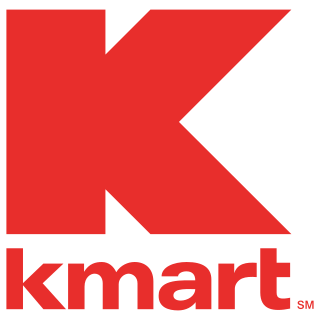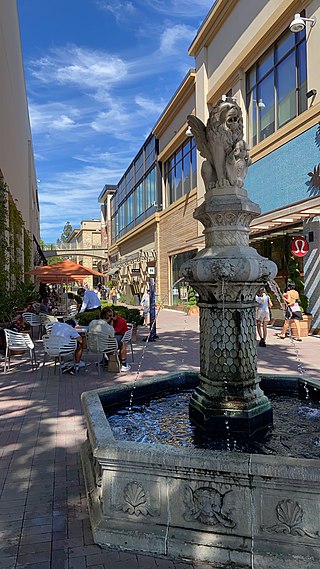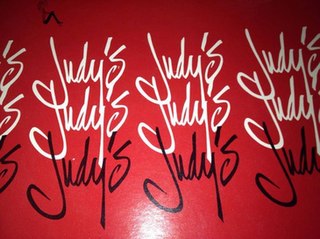
Nordstrom, Inc. is an American luxury department store chain headquartered in Seattle, Washington, and founded by John W. Nordstrom and Carl F. Wallin in 1901. The original Wallin & Nordstrom store operated exclusively as a shoe store, and a second Nordstrom's shoe store opened in 1923. The growing Nordstrom Best chain began selling clothing in 1963, and became the Nordstrom full-line retailer that presently exists by 1971. The company founded its off-price Nordstrom Rack division in 1973, and grew both full-line and off-price divisions throughout the United States in the following years before expanding into Canada in 2014. In the American market, it competes with department stores including Bloomingdale's, Macy's, Neiman Marcus, and Saks Fifth Avenue.

Kmart Corporation is an American retail company that owns a chain of big box department stores. The company is headquartered in Hoffman Estates, Illinois, United States. The company was incorporated in 1899 as S. S. Kresge Corporation and renamed Kmart Corporation in 1977. The first store with the Kmart name opened in 1962 in Garden City, Michigan. At its peak in 1994, Kmart operated 2,486 stores globally, including 2,323 discount stores and Super Kmart Center locations in the United States. As of April 16, 2022, that number was down to nine, including just three in the continental United States. From 2005 through 2019, Kmart was a subsidiary of Sears Holdings Corporation. Since 2019, Kmart has been a subsidiary of Transform SR Brands LLC, a privately held company that was formed in 2019 to acquire assets from Sears Holdings.

Broadway Stores, Inc., was an American retailer based in Southern California. Known through its history as Carter Hawley Hale Stores and Broadway Hale Stores over time, it acquired other retail store chains in regions outside its California home base and became in certain retail sectors a regional and national retailer in the 1970s and 1980s. The company was able to survive takeover attempts in 1984 and 1986, and also a Chapter 11 bankruptcy filing in 1991 by selling off most of its assets until August 1995 when its banks refused to advance enough additional credit in order for the company to be able to pay off suppliers. At that point, the company sold itself to Federated Department Stores for $1.6 billion with the acquisition being completed on October 12, 1995.

Pacific Sunwear of California, LLC is an American retail clothing brand. The company sells lifestyle apparel, along with swim, footwear and accessories designed for teens and young adults. As of 2022, the company operates 325 stores in all 50 states and Puerto Rico. PacSun is headquartered in Anaheim, California, and operates a distribution center in Groveport, Ohio. The company's regional directors, district managers and store positions are located throughout the United States. The company went bankrupt in April 2016 and is now owned by Golden Gate Capital.
Barneys New York Inc. is an American luxury brand founded in New York City in 1923. It has introduced major designers including Armani, Azzedine Alaïa, Comme des Garçons, Christian Louboutin, and Ermenegildo Zegna to the US market.
Service Merchandise was a retail chain of catalog showrooms carrying jewelry, toys, sporting goods, and electronics. The company, which first began in 1934 as a five-and-dime store, was in existence for 68 years before ceasing operations in 2002.
Forever 21 is a multinational fast fashion retailer headquartered in Los Angeles, California, United States. Originally founded as the store Fashion 21 in Highland Park, Los Angeles in 1984, it is currently operated by Authentic Brands Group and Simon Property Group, with about 540 outlets.

Bullock's was a chain of full-line department stores from 1907 through 1995, headquartered in Los Angeles, growing to operate across California, Arizona and Nevada. Bullock's also operated as many as seven more upscale Bullocks Wilshire specialty department stores across Southern California. Many former Bullock's locations continue to operate as Macy's.

Ann Inc. is an American group of specialty apparel retail chain stores for women. The company headquartered in New York City and currently operates as a subsidiary of Ascena Retail Group. The stores offer classic-styled suits, separates, dresses, shoes and accessories. The brand is marketed under five divisions: Ann Taylor, Loft, Lou & Grey, Ann Taylor Factory, and Loft Outlet.

Wet Seal was an American fast fashion retailer, headquartered in Los Angeles, California. The retailer specialized in selling clothing and accessories. The company was founded in Newport Beach, California, by Lorne Huycke in 1962 as "Lorne's". The "Wet Seal" name is derived from a comment Huycke's wife made during a fashion show that a model wearing a bathing suit looked like a "wet seal." The company was incorporated as Wet Seal in 1990.

Anchor Blue Inc. was an American clothing retailer which had over 100 stores in the western United States. It generally sold its own Anchor Blue brand name of youth-oriented denim, graphic T-shirts and casual clothing. Sometimes the company was referred to as the Anchor Blue Inc., but their retail clothing chain of stores was labeled as Anchor Blue. The Anchor Blue and Miller's Outpost brands were acquired by Perry Ellis International in 2012.

The Children's Place Inc. is a specialty retailer of children's apparel and accessories headquartered in Secaucus, New Jersey. It also markets apparel under the Children's Place, Place, Baby Place, and Gymboree brand names.
B.U.M. Equipment, a clothing brand under the ownership of BUM Equipment LLC, is a street fashion clothing company that was founded in 1986 in a Seattle garage. The brand is known for its beginning as a Los Angeles casual sportswear brand for men, women, and children. The brand had financial troubles in the mid-1990s under the management of the original owner, Chauvin International, Ltd. It went bankrupt in 1996 and was acquired by the creditors of B.U.M. International Inc. and managed by SOS Management in 1997. SOS Management, and its successor B.U.M. Equipment LLC, subsequently relaunched B.U.M. Equipment. The brand's fashion lines include men's, women's, junior's, and children's sportswear apparel, as well as hosiery, footwear, backpacks, handbags, luggage, and eyewear. According to the LA Times, B.U.M. Equipment is "one of the most successful young men's sportswear brands in California fashion history."

Max Azria was a Tunisian-Jewish-born American fashion designer who founded the contemporary women's clothing brand BCBG MAX AZRIA. Azria was also the designer, chairman and CEO of the BCBG Max Azria Group, a global fashion house that encompassed over 20 brands. Azria left BCBG in 2016. BCBG Max Azria filed for bankruptcy in 2017 and was sold to Marquee Brands and Global Brands Group.

Cherokee Inc., also known as Apex Global Brands, is an American based global apparel and footwear company, headquartered in Sherman Oaks, California. The company was established in 1973 and its brands are available in 110 countries in 12,000 retail locations and on digital commerce.

Broadway Plaza is an outdoor shopping mall located in downtown Walnut Creek. The shopping center opened on October 11, 1951 and is owned and operated by Macerich. The mall is anchored by Nordstrom and Macy's, and features nearly 80 stores including Crate & Barrel, flagship H&M and ZARA stores, a standalone Apple store with an adjoining outdoor plaza, an Industrious co-working space, a planned Pinstripes entertainment center and restaurant, and a planned Life Time Fitness sports club.
Edison Brothers Stores, Inc., was a retail conglomerate based in St. Louis, Missouri. It operated numerous retail chains mainly located in shopping malls, mostly in the fields of shoes, clothing and entertainment, with Bakers Shoes as its flagship chain. The company was liquidated and condemned in 1999, though some of the chains it operated continued under different owners.

Retail apocalypse refers to the closing of numerous brick-and-mortar retail stores, especially those of large chains, beginning around 2010 and accelerating due to the mandatory closures during the COVID-19 pandemic.

Judy's was a chain of clothing stores, based in Van Nuys, Los Angeles. Marcia Israel founded Judy's in 1946 and ran it until 1989 when she sold it to Laws International of Hong Kong for $31 million. Israel-Curley died in 2004.













